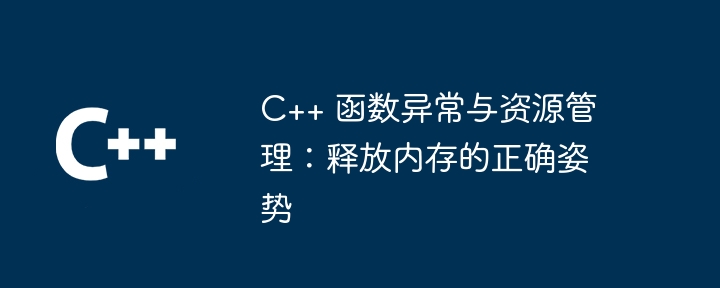Home >Backend Development >C++ >C++ function exceptions and resource management: the correct approach to releasing memory
C++ function exceptions and resource management: the correct approach to releasing memory
- 王林Original
- 2024-05-03 09:36:01897browse
In C, through proper exception handling and resource management, memory can be released and resources managed safely and efficiently: Exception handling: try-catch blocks are used to catch and handle exceptions, and release acquired resources to prevent memory leaks. Resource management: Smart pointer classes such as std::unique_ptr and std::shared_ptr are used to manage exclusive or shared ownership of objects, automatically releasing the object upon destruction. Practical example: The readFile() function uses std::unique_ptr to manage the file stream object to ensure that resources are released when an exception occurs.

C function exception and resource management: the correct posture to release memory
In C, managing memory and resources is crucial . Exceptions can lead to memory leaks and resources not being released, leading to application instability or even crashes. This article explores how to release memory and manage resources in a safe and efficient manner through appropriate exception handling and resource management techniques.
Exception handling
The exception handling mechanism allows a program to catch and handle unexpected events, such as memory access violations, division by zero, or other runtime errors. To handle exceptions, a try-catch block can be used:
try {
// 可能会引发异常的代码
} catch (const std::exception& e) {
// 捕获异常并处理
}It is important to release any acquired resources in the exception handler to prevent memory leaks.
Resource Management
C provides several built-in smart pointer classes to simplify resource management:
-
std::unique_ptr: Manage exclusive ownership of a single object. It will automatically release the object when it is destroyed. -
std::shared_ptr: Manages shared ownership of objects. The reference count keeps track of the object's usage, and the object is automatically released when all references are gone.
Practical Case
Consider a function that reads the contents of a file and stores it in std::vector424b5ca5994d08464738b3617afd1719. Under normal circumstances, std::getline() will throw a std::ios_base::failure exception if the file does not exist or cannot be opened.
std::vector<char> readFile(const std::string& filename) {
std::ifstream file(filename);
if (!file.is_open()) {
throw std::ios_base::failure("无法打开文件 " + filename);
}
std::vector<char> content;
std::string line;
while (std::getline(file, line)) {
content.insert(content.end(), line.begin(), line.end());
content.push_back('\n');
}
if (!file) {
throw std::ios_base::failure("无法读取文件 " + filename);
}
return content;
}In the readFile() function, we use std::unique_ptr to manage exclusive ownership of the file stream object. When the function returns or throws an exception, the file stream object will automatically close and release resources during destruction, ensuring that the file is closed correctly, even if an exception occurs.
The above is the detailed content of C++ function exceptions and resource management: the correct approach to releasing memory. For more information, please follow other related articles on the PHP Chinese website!

